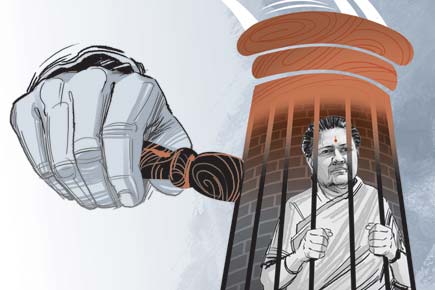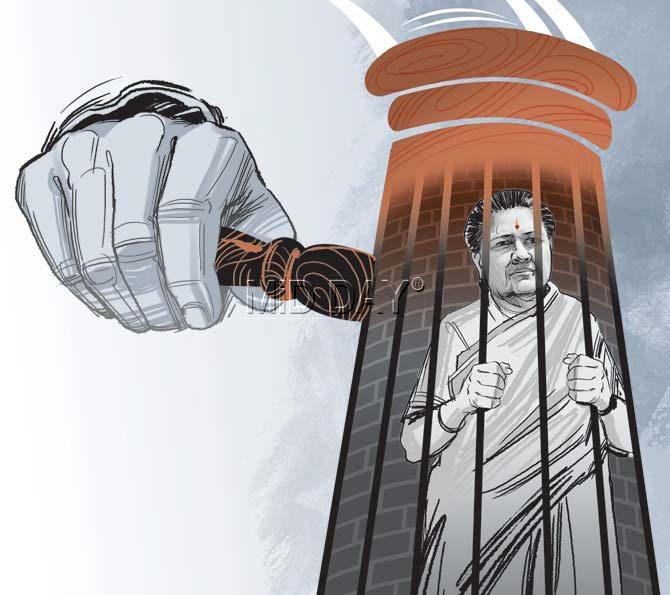Supreme Court upholds Sasikala’s conviction in disproportionate assets case, dashes her dreams of becoming chief minister as crisis looms in Tamil Nadu


Illustration/ Ravi Jadhav
It took the prosecution 20 years to bring Jayalalithaa’s Disproportionate Assets case to fruition, but it took not more than 2 minutes for the two judges of the Supreme Court to pronounce the verdict which sealed the fate of Sasikala and altered the course of Tamil Nadu politics.
ADVERTISEMENT
The verdict in the 1997 DA case, in which Jayalalithaa was accused of accumulating wealth beyond her known sources of income – and three others, Sasikala, Ilavarasi and VN Sudhakaran were named as co-conspirators – was set to be pronounced at 10.30am in court hall no. 6 on Tuesday.
Justices Amitava Roy and Pinaki Chandra Ghose arrived at 10.35am to a packed court hall, with over hundred lawyers and the original petitioner in the case, Subramaniam Swamy, present.
'Fatty judgment'
After Justices Roy and Ghose arrived, they conferred briefly, and Ghose started speaking. “As you can see,” he said, holding the 560-page long judgment, “this is a fatty judgment.” Justice Roy added, “I would say this is a well-considered judgment.” And within the next minute, Sasikala, her sister-in-law Ilavarasi and her nephew Sudhakaran were declared guilty for conspiring with Jayalalithaa in amassing wealth illegally. Since Jayalalithaa had ‘expired’, the case against her stood abated, although the verdict declared her too guilty.
The verdict, in its essence, was fairly simple. In September 2014, the Bengaluru special court hearing the DA case convicted Jayalalithaa and three others in the case, in a judgment which was widely seen as ‘water-tight’. In May 2015, however, the Karnataka HC acquitted all the accused, amidst widespread criticism of mathematical errors in its verdict.
The sentence
On Tuesday, the Supreme Court simply set aside the Karnataka HC’s verdict and restored the verdict of the trial court, delivered by judge John Michael D’Cunha. The trial court had sentenced all the four accused to four years in jail and a fine of Rs. 100 crore for Jayalalithaa, and Rs. 10 crore each for the three others. The trial court had also ordered confiscation of the property and money earned disproportionately. The directions now stand to be implemented after the SC order. The court also ordered the three accused to surrender before the Bengaluru trial court ‘forthwith’. Both the judges concurred on the judgement.
What raised eyebrows in the judgment however was Justice Roy’s blazing, acerbic supplementary. Stating that the facts of the case demonstrated a “deep rooted conspiratorial design to amass vast assets without any compunction” and “deceive and delude the process of law”, he wrote that “the magnitude of the nefarious gains as demonstrated by the revelations in the case are, to say the least, startling.” He further said that the judiciary needed ‘moral maturity’ in dealing with cases of corruption, and not allow the defense to force acquittals based on “Innovative nuances of evidential inadequacies, processual infirmities and interpretational subtleties”.
Back in Chennai, the response to the court’s verdict ranged from celebrations to stark silence. At the house of incumbent CM O Panneerselvam, who is engaged in a power struggle with Sasikala, sweets were distributed and firecrackers set off. But at Golden Bay resort, where Sasikala and 119 MLAs were holed up, there was little activity and increasing police presence to preempt any violence. The Kanchipuram district administration imposed section 144 in Koovathur, where the luxury resort is located. Sasikala did not speak to the media.
AIADMK stakes claim
Just hours after the verdict, the Sasikala camp hit out at the OPS camp with the suspension of 20 AIADMK leaders, including OPS, for ‘anti-party’ activities. Soon after, Minister Edapadi Palanisamy, a Sasikala nominee, was elected as the Leader of the Legislature Party of the AIADMK, clearing the way for him to become the CM. He immediately met the Governor C Vidyasagar Rao and staked claim to form the government.
What is in store for Tamil Nadu next will depend on the numbers that each camp – Sasikala and OPS – hold.With Palanisamy having staked claim, and no legal issue facing him unlike Sasikala, the Governor is duty-bound to ask him to form the government. But with O Panneerselvam maintaining that the 123 MLAs were forced to elect Palanisamy by Sasikala, and the other 11 MLAs supporting him, the Governor could consider a floor test at the Assembly. At the floor test, either of the camps could win, or a hung assembly could send the ball back to the Governor’s court, who then has the option of imposing the President’s Rule. In the coming days, Tamil Nadu is expected to witness further political uncertainty and drama, but for now, all eyes are on the Governor.
 Subscribe today by clicking the link and stay updated with the latest news!" Click here!
Subscribe today by clicking the link and stay updated with the latest news!" Click here!







